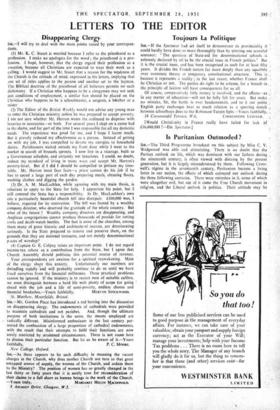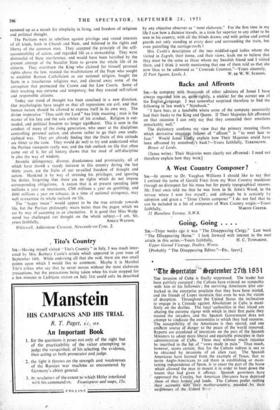Is Puritanism Outmoded?
SIR,—The Third Programme broadcast on this subject by Miss C. V. Wedgwood was able and stimulating. There is no doubt that the , Puritan outlook on life, which was dominant with our fathers during , the nineteenth century, is often viewed with distasts by the present generation, but it is largely misunderstood by them. Following Crom- , well's regime in the seventeenth century, Puritanism became a living force in our nation, the effects of which coloured our outlook during' the three following centuries. There were extremes in it, some of which were altogether evil, but out of it came the Free Church_ movement in , relig;on, and the Liberal outlook in politics. Their attitude may be summed up as a search for simplicity in living, and freedom of religious and political thought.
The Puritans were in rebellion against privilege and vested interests of all kinds, both in Church and State, and believed in the rights and liberty of the common man. They accepted the principle of the self- accountability of action, and regarded life as a stewardship. They were distrustful- of State interference, and would have been horrified by the present attempt of the Socialist State to govern the whole life of its citizens. They overthrew the King who claimed for himself personal rights above the law, resisted the machinations of the Pope who sought to establish Roman Catholicism as our national religion, fought the Scots in a treacherous religious war, and cleared away some of the corruption that permeated the Crown and the Law Courts. Some of their teaching was extreme and temporary; but they created self-reliant and responsible citizens. - Today our trend of thought has been canalised in a new direction. Our psychologists have taught us that all repressions are evil, and that human nature should be allowed to express itself in its own way. The divine imperative "Thus saith the Lord" has little meaning ; man is the master of his fate and the sole arbiter of his conduct. Religion is out- moded, and political freedom no longer significant. This is seen in the conduct of many of the rising generation, who sneer at the disciplines controlling personal action, and choose rather to go their own undis- ciplined way. They are already finding that the fruits of this attitude are bitter to the taste. They would de well to try and understand what the Puritan viewpoint really was, and the rich outlook on life that often came out of it, for all history shows that the road of self-discipline is also the way of wisdom.
Juvenile delinquency, divorce, drunkenness and promiscuity, all of which have showli a steady increase in this country during the last thirty years, are the fruits of our so-called freedom of thought and action. Mankind is by way of stressing his privileges, and ignoring his duties, forgetting that there are no rights which do not impose corresponding obligations. A nation 'that is at present spending 1600 millions a year on intoxicants, £700 millions a year on gambling, and £600 millions a year on tobacco, in a time of national stringency, may well re-examine its whole outlook on life.
The "happy mean" would appear to be the true attitude towards life, but the Puritan philosophy wears better than the pagan, which we are by way of accepting as an alternative. It is good that Miss Wedg- wood has challenged our thought on the whole subject.—I am, Sir,



































 Previous page
Previous page